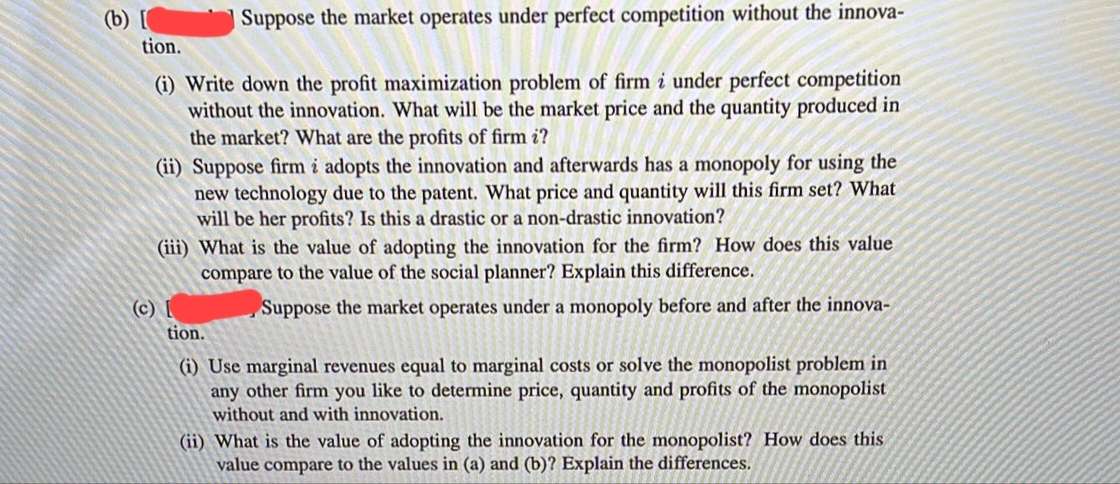Suppose the market operates under perfect competition without the innova- tion. (i) Write down the profit maximization problem of firm i under perfect competition without the innovation. What will be the market price and the quantity produced in the market? What are the profits of firm i? (ii) Suppose firm i adopts the innovation and afterwards has a monopoly for using the new technology due to the patent. What price and quantity will this firm set? What will be her profits? Is this a drastic or a non-drastic innovation? (b) [
Suppose the market operates under perfect competition without the innova- tion. (i) Write down the profit maximization problem of firm i under perfect competition without the innovation. What will be the market price and the quantity produced in the market? What are the profits of firm i? (ii) Suppose firm i adopts the innovation and afterwards has a monopoly for using the new technology due to the patent. What price and quantity will this firm set? What will be her profits? Is this a drastic or a non-drastic innovation? (b) [
Chapter1: Making Economics Decisions
Section: Chapter Questions
Problem 1QTC
Related questions
Question

Transcribed Image Text:Assume the demand for a particular product is given by p = 120 q and firms produce at
linear costs c(q) = cq = 80q. Suppose a new production technology lowers marginal costs
to 60, i.e., firms can produce with c(q) = cq = 60q, if they spend K. The innovation is
protected by a patent, i.e., only the firm who adopts the innovation can produce at the lower
cost.

Transcribed Image Text:Suppose the market operates under perfect competition without the innova-
tion.
(i) Write down the profit maximization problem of firm i under perfect competition
without the innovation. What will be the market price and the quantity produced in
the market? What are the profits of firm i?
(ii) Suppose firm i adopts the innovation and afterwards has a monopoly for using the
new technology due to the patent. What price and quantity will this firm set? What
will be her profits? Is this a drastic or a non-drastic innovation?
(iii) What is the value of adopting the innovation for the firm? How does this value
compare to the value of the social planner? Explain this difference.
(c) [
Suppose the market operates under a monopoly before and after the innova-
tion.
(i) Use marginal revenues equal to marginal costs or solve the monopolist problem in
any other firm you like to determine price, quantity and profits of the monopolist
without and with innovation.
(ii) What is the value of adopting the innovation for the monopolist? How does this
value compare to the values in (a) and (b)? Explain the differences.
(b) [
Expert Solution
This question has been solved!
Explore an expertly crafted, step-by-step solution for a thorough understanding of key concepts.
Step by step
Solved in 3 steps

Knowledge Booster
Learn more about
Need a deep-dive on the concept behind this application? Look no further. Learn more about this topic, economics and related others by exploring similar questions and additional content below.Recommended textbooks for you


Principles of Economics (12th Edition)
Economics
ISBN:
9780134078779
Author:
Karl E. Case, Ray C. Fair, Sharon E. Oster
Publisher:
PEARSON

Engineering Economy (17th Edition)
Economics
ISBN:
9780134870069
Author:
William G. Sullivan, Elin M. Wicks, C. Patrick Koelling
Publisher:
PEARSON


Principles of Economics (12th Edition)
Economics
ISBN:
9780134078779
Author:
Karl E. Case, Ray C. Fair, Sharon E. Oster
Publisher:
PEARSON

Engineering Economy (17th Edition)
Economics
ISBN:
9780134870069
Author:
William G. Sullivan, Elin M. Wicks, C. Patrick Koelling
Publisher:
PEARSON

Principles of Economics (MindTap Course List)
Economics
ISBN:
9781305585126
Author:
N. Gregory Mankiw
Publisher:
Cengage Learning

Managerial Economics: A Problem Solving Approach
Economics
ISBN:
9781337106665
Author:
Luke M. Froeb, Brian T. McCann, Michael R. Ward, Mike Shor
Publisher:
Cengage Learning

Managerial Economics & Business Strategy (Mcgraw-…
Economics
ISBN:
9781259290619
Author:
Michael Baye, Jeff Prince
Publisher:
McGraw-Hill Education